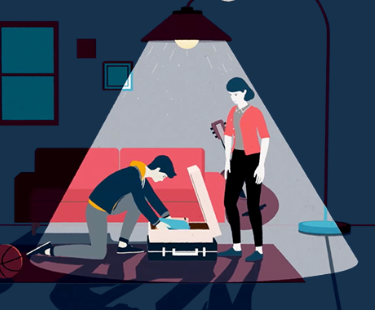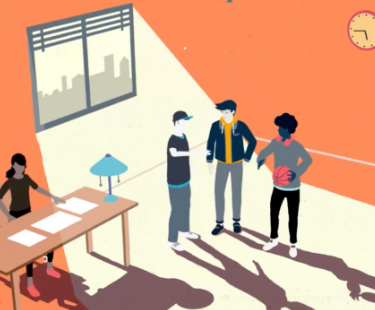HERE’S WHAT YOU NEED TO KNOW
There are different types of vaccines to help prevent meningitis. Meningitis B is not covered by the routine meningitis ACWY vaccine your teen likely received when they were younger (usually between 11-12 years old).

WHILE MENINGITIS B IS UNCOMMON, ADOLESCENTS AND YOUNG ADULTS ARE MORE LIKELY TO ENGAGE IN CERTAIN COMMON BEHAVIORS THAT ARE RISK FACTORS FOR GETTING THE DISEASE, SUCH AS SHARING DRINKS AND LIVING IN CLOSE QUARTERS

CDC DATA FROM 2015 TO 2019 SHOWED THAT 60% OF 266 MENINGITIS CASES IN 16 TO 23 YEAR OLDS WERE CAUSED BY MENINGITIS B

MENINGITIS B VACCINATION WAS NOT AVAILABLE UNTIL LATE 2014, SO THERE’S A CHANCE THAT YOUR LOVED ONE HAS NOT BEEN VACCINATED
Vaccination may not protect all recipients.
Actor portrayals.
MENINGITIS B OUTBREAKS ON US COLLEGE CAMPUSES
From 2011 through March 2019, colleges and universities in these states reported meningitis B outbreaks.*

OREGON
(2015, 2016)

WISCONSIN
(2016)

RHODE ISLAND
(2015)

PENNSYLVANIA
(2011, 2017)

CALIFORNIA
(2014, 2016, 2018)

MASSACHUSETTS
(2017)

NEW JERSEY
(2013, 2016, 2019)

NEW YORK
(2019)
14 MENINGITIS B OUTBREAKS ON 13 COLLEGE CAMPUSES FROM 2011 TO 2019
50 MENINGITIS B CASES, INCLUDING 2 DEATHS, AT COLLEGES OR UNIVERSITIES ACROSS THE US FROM 2011 TO 2019 AMONG AN AT-RISK POPULATION OF APPROXIMATELY 253,000 STUDENTS
*An outbreak is defined as 2-3 outbreak-associated cases within a 3-month time period.
HOW IS MENINGITIS SPREAD?
The bacteria that cause meningitis B are generally spread by direct contact of one person with another. Bacteria that cause meningitis B live within the nose and throat of an infected person or a person who is a carrier of the bacteria. The bacteria can be spread through certain everyday behaviors including:

COUGHING & SNEEZING

SHARING DRINKS & UTENSILS

KISSING

LIVING IN CLOSE QUARTERS
Although meningitis B is uncommon, it can spread through close contact with someone who is infected. However, it’s not as contagious as, for example, the flu.
Meningitis B is unpredictable and can strike otherwise healthy individuals. Most carriers do not get sick, though they can still potentially spread meningitis B to others. We don’t really know why only about 1% of carriers develop the disease, while others do not.
DON’T RISK YOUR CHILD’S HEALTH. TALK TO THEIR DOCTOR TODAY.
Although uncommon, meningitis can have serious consequences. And according to the CDC, vaccination is the best defense against it. The decision to vaccinate against meningitis B relies on an important conversation between healthcare provider and parent – not all doctors will mention it. Ask your child’s healthcare provider about meningitis B vaccination.
LIFE AFTER MENINGITIS
Up to 20% of survivors face long-term consequences.

VISIBLE CONSEQUENCES
SEPTICEMIA—A BLOOD INFECTION CAUSED BY MENINGITIS—CAN LEAD TO LOSS OF LIMBS AND PERMANENT SKIN SCARRING

INVISIBLE CONSEQUENCES
MENINGITIS B ATTACKS THE BRAIN AND SPINAL CORD, WHICH CAN LEAD TO COGNITIVE DISABILITIES, NERVOUS SYSTEM PROBLEMS, SUCH AS SEIZURES, AND DEAFNESS
Actor portrayals.


